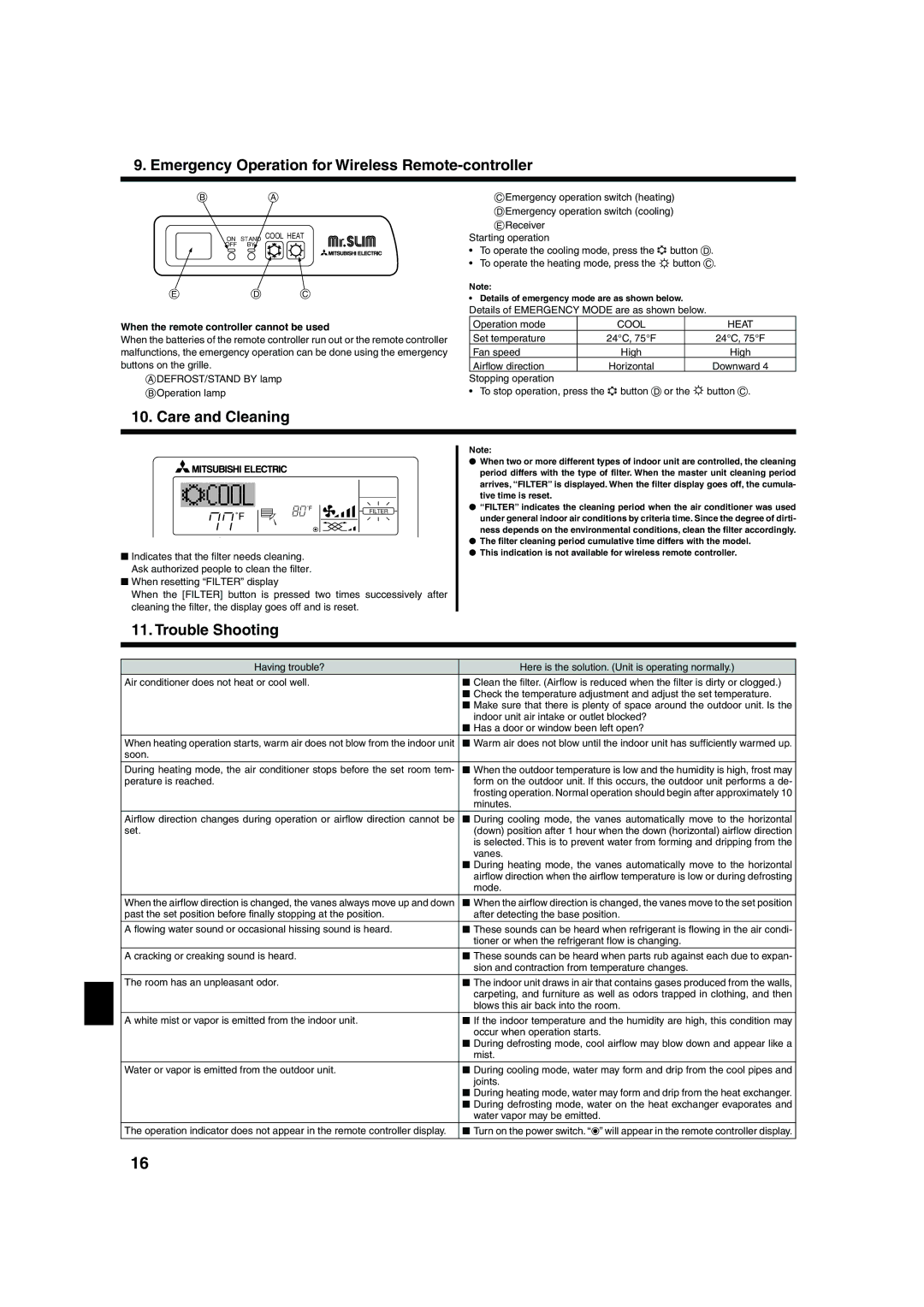
9. Emergency Operation for Wireless Remote-controller
BA
ON STAND COOL HEAT
OFF BY
E D C
When the remote controller cannot be used
When the batteries of the remote controller run out or the remote controller malfunctions, the emergency operation can be done using the emergency buttons on the grille.
ADEFROST/STAND BY lamp BOperation lamp
CEmergency operation switch (heating) DEmergency operation switch (cooling) EReceiver
Starting operation
•To operate the cooling mode, press the ![]() button D.
button D.
•To operate the heating mode, press the ![]() button C.
button C.
Note:
•Details of emergency mode are as shown below.
Details of EMERGENCY MODE are as shown below.
Operation mode |
| COOL |
| HEAT |
Set temperature |
| 24°C, 75°F |
| 24°C, 75°F |
Fan speed |
| High |
| High |
Airflow direction |
| Horizontal |
| Downward 4 |
Stopping operation |
|
|
| |
• To stop operation, press the | button D or the | button C. | ||
10. Care and Cleaning
˚F | ˚F | FILTER |
|
|
 TEMP.
TEMP. ON/OFF
ON/OFF
■Indicates that the filter needs cleaning. Ask authorized people to clean the filter.
■When resetting “FILTER” display
When the [FILTER] button is pressed two times successively after cleaning the filter, the display goes off and is reset.
Note:
●When two or more different types of indoor unit are controlled, the cleaning period differs with the type of filter. When the master unit cleaning period arrives, “FILTER” is displayed. When the filter display goes off, the cumula- tive time is reset.
●“FILTER” indicates the cleaning period when the air conditioner was used under general indoor air conditions by criteria time. Since the degree of dirti- ness depends on the environmental conditions, clean the filter accordingly.
●The filter cleaning period cumulative time differs with the model.
●This indication is not available for wireless remote controller.
11. Trouble Shooting
Having trouble? | Here is the solution. (Unit is operating normally.) |
Air conditioner does not heat or cool well. | ■ Clean the filter. (Airflow is reduced when the filter is dirty or clogged.) |
| ■ Check the temperature adjustment and adjust the set temperature. |
| ■ Make sure that there is plenty of space around the outdoor unit. Is the |
| indoor unit air intake or outlet blocked? |
| ■ Has a door or window been left open? |
When heating operation starts, warm air does not blow from the indoor unit | ■ Warm air does not blow until the indoor unit has sufficiently warmed up. |
soon. |
|
During heating mode, the air conditioner stops before the set room tem- | ■ When the outdoor temperature is low and the humidity is high, frost may |
perature is reached. | form on the outdoor unit. If this occurs, the outdoor unit performs a de- |
| frosting operation. Normal operation should begin after approximately 10 |
| minutes. |
Airflow direction changes during operation or airflow direction cannot be | ■ During cooling mode, the vanes automatically move to the horizontal |
set. | (down) position after 1 hour when the down (horizontal) airflow direction |
| is selected. This is to prevent water from forming and dripping from the |
| vanes. |
| ■ During heating mode, the vanes automatically move to the horizontal |
| airflow direction when the airflow temperature is low or during defrosting |
| mode. |
When the airflow direction is changed, the vanes always move up and down | ■ When the airflow direction is changed, the vanes move to the set position |
past the set position before finally stopping at the position. | after detecting the base position. |
A flowing water sound or occasional hissing sound is heard. | ■ These sounds can be heard when refrigerant is flowing in the air condi- |
| tioner or when the refrigerant flow is changing. |
A cracking or creaking sound is heard. | ■ These sounds can be heard when parts rub against each due to expan- |
| sion and contraction from temperature changes. |
The room has an unpleasant odor. | ■ The indoor unit draws in air that contains gases produced from the walls, |
| carpeting, and furniture as well as odors trapped in clothing, and then |
| blows this air back into the room. |
A white mist or vapor is emitted from the indoor unit. | ■ If the indoor temperature and the humidity are high, this condition may |
| occur when operation starts. |
| ■ During defrosting mode, cool airflow may blow down and appear like a |
| mist. |
Water or vapor is emitted from the outdoor unit. | ■ During cooling mode, water may form and drip from the cool pipes and |
| joints. |
| ■ During heating mode, water may form and drip from the heat exchanger. |
| ■ During defrosting mode, water on the heat exchanger evaporates and |
| water vapor may be emitted. |
The operation indicator does not appear in the remote controller display. | ■ Turn on the power switch. “ ” will appear in the remote controller display. |
|
|
16
